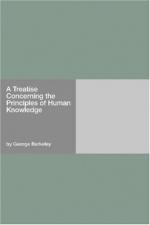121. However, since there may be some who, deluded by the specious show of discovering abstracted verities, waste their time in arithmetical theorems and problems which have not any use, it will not be amiss if we more fully consider and expose the vanity of that pretence; and this will plainly appear by taking a view of Arithmetic in its infancy, and observing what it was that originally put men on the study of that science, and to what scope they directed it. It is natural to think that at first, men, for ease of memory and help of computation, made use of counters, or in writing of single strokes, points, or the like, each whereof was made to signify an unit, i.e., some one thing of whatever kind they had occasion to reckon. Afterwards they found out the more compendious ways of making one character stand in place of several strokes or points. And, lastly, the notation of the Arabians or Indians came into use, wherein, by the repetition of a few characters or figures, and varying the signification of each figure according to the place it obtains, all numbers may be most aptly expressed; which seems to have been done in imitation of language, so that an exact analogy is observed betwixt the notation by figures and names, the nine simple figures answering the nine first numeral names and places in the former, corresponding to denominations in the latter. And agreeably to those conditions of the simple and local value of figures, were contrived methods of finding, from the given figures or marks of the parts, what figures and how placed are proper to denote the whole, or vice versa. And having found the sought figures, the same rule or analogy being observed throughout, it is easy to read them into words; and so the number becomes perfectly known. For then the number of any particular things is said to be known, when we know the name of figures (with their due arrangement) that according to the standing analogy belong to them. For, these signs being known, we can by the operations of arithmetic know the signs of any part of the particular sums signified by them; and, thus computing in signs (because of the connexion established betwixt them and the distinct multitudes of things whereof one is taken for an unit), we may be able rightly to sum up, divide, and proportion the things themselves that we intend to number.
122. In Arithmetic, therefore, we regard not the things, but the signs, which nevertheless are not regarded for their own sake, but because they direct us how to act with relation to things, and dispose rightly of them. Now, agreeably to what we have before observed of words in general (sect. 19, Introd.) it happens here likewise that abstract ideas are thought to be signified by numeral names or characters, while they do not suggest ideas of particular things to our minds. I shall not at present enter into a more particular dissertation on this subject, but only observe that it is evident from what has been




